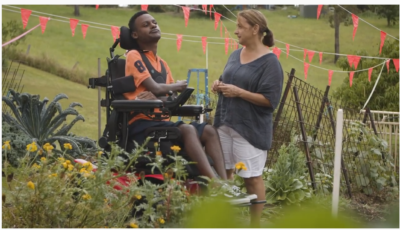Life After School: What Next? Tips and tricks to help you adjust and find your place.
This article provides tips and resources so graduates with neuromuscular conditions can be prepared for this big change, as well as insight for parents, families and supporters. Whether you’re enrolling in university, moving out of home, or navigating other big changes, explore our tips for keeping a sense of ease and structure, along with advice from other young people living with neuromuscular conditions.
With graduation hats being thrown in the air and formals done and dusted, many grade 12 graduates are entering the next phase in their lives. Between planning post graduation trips and imagining what university, work and life might look like, this period can be filled with a lot of stress and unknowns.
This article provides tips and resources so graduates with neuromuscular conditions can be prepared for this big change, as well as insight for parents, families and supporters. Whether you’re enrolling in university, moving out of home, or navigating other big changes, explore our tips for keeping a sense of ease and structure, along with advice from other young people living with neuromuscular conditions.
For someone who is about to transition out of high school, I would say that it isn't as bad as it may seem. Yes, it is a large change of pace, but for me at least, it was a good one.” - Jaxon from New South Wales
Things will be harder; you are moving to a whole new stage of life, and this is no simple thing. Keep pursuing that goal and don't worry if it doesn't happen in the exact way you were wanting." - Sophy from Queensland
Finding Your Path
It is totally normal to not know what you want to do after high school. Even if you feel like there’s pressure to have it all figured out, it’s okay to take your time. Everyone’s path looks different, which is especially true when balancing your health and goals. Focus on exploring what excites you and what feels manageable – whether it’s pursuing further education, learning new skills, or finding a routine that works for you..
To start with, categorise your ideas into different lists to help you narrow down your decisions. Some of these lists can include:
Your talents/what makes you happy/how you can turn this into a career.
Pros and cons of your current job (if applicable).
Possible further study options or courses that interest you.
Accessibility needs and how they might influence your choices.
Short and long term goals.
Support networks or resources available to help you succeed.
Financial considerations, such as potential costs or scholarships.
Ways to maintain a healthy balance between work, education, and your condition.
Advocating for Your Needs in New Environments
Advocating for your needs is essential so you get the support you need in new learning or working environments. Begin by understanding your rights and any accommodations available, such as building accessibility or flexible schedules.
After researching what accommodation options that will best suit you, set aside a time to have a conversation about them with employers or educators, and if applicable, provide medical documentation or examples of past accommodations that worked well for you.
You can also look into a disability advocate, if you feel that you are unable to act, speak or write about a difficult situation on your own, or don’t have a support network to help you do so. Disability advocates help you understand your rights, access services and resources or act on your behalf to ensure you receive the accessibility requirements you need.
Managing Healthcare During the Transition
Moving from pediatric care to adult care is a big adjustment, but it’s an important step toward taking control of your health and making health decisions as you grow older. Before you turn 18, or soon after, is a great time to take an active role in understanding your medical needs. Start by familiarising yourself with your condition, medications, and treatment plans. If you’ll be moving for university or work, update your healthcare providers about these changes so they can help you prepare. Make sure to schedule regular check-ups and ask about how to access resources, such as local specialists or accessible facilities.
Parents’ Guide: Supporting Without Overstepping
As your child transitions into adulthood, it's natural to want to offer support, but it’s important to find the right balance so they can maintain and build independence. Encourage self-advocacy by helping them develop the skills to communicate their needs, especially in healthcare or educational settings. At the same time, be ready to step in if they need help navigating complex situations or when extra support is required. By offering your support without overstepping, you’ll help them feel more confident as they transition into this new phase of their life.
Hear From Others
“What I would say is that my transition from school to university has suited me quite well. I've been able to have earlier classes which suits my fatigue, and the nature of university has highlighted my independence. For example, I've been able to get coffee on my own at the uni, and meet a support worker there rather than bringing one with me from home. For someone who is about to transition out of high school, I would say that it isn't as bad as it may seem. Yes, it is a large change of pace, but for me at least, it was a good one. The only other tip I would say is just to be open to change, as it's hard to predict exactly how your life will need to be adapted.” - Jaxon from New South Wales
"After high school, I chose to continue my education through university. As I come from a regional town, this involved moving away from my hometown and many of my childhood friends. For me, there were two very difficult things post high school. First was finding those connections again and having to make friends for the first time in a long time. The second was the sudden change to everything essentially being a choice. I would choose to go to my lectures, I would choose to submit my assessments on time.
My advice for those that have chosen to pursue a path similar to mine, would be to be kind to yourself, focus on whatever goal you have given to yourself and don't forget to enjoy the journey along the way. Things will be harder; you are moving to a whole new stage of life, and this is no simple thing. Keep pursuing that goal and don't worry if it doesn't happen in the exact way you were wanting." - Sophy from Queensland
Here more about The Loop’s community member’s transition to life after high school by reading Jack’s story.
Have advice, 'how to' guides or a story you want to share? We want to hear from you!
You can submit your story or guide via our form. Provided your content meets our content requirements, your post will be published by a Loop moderator to the Living Life section.
Share your story



Join the conversation